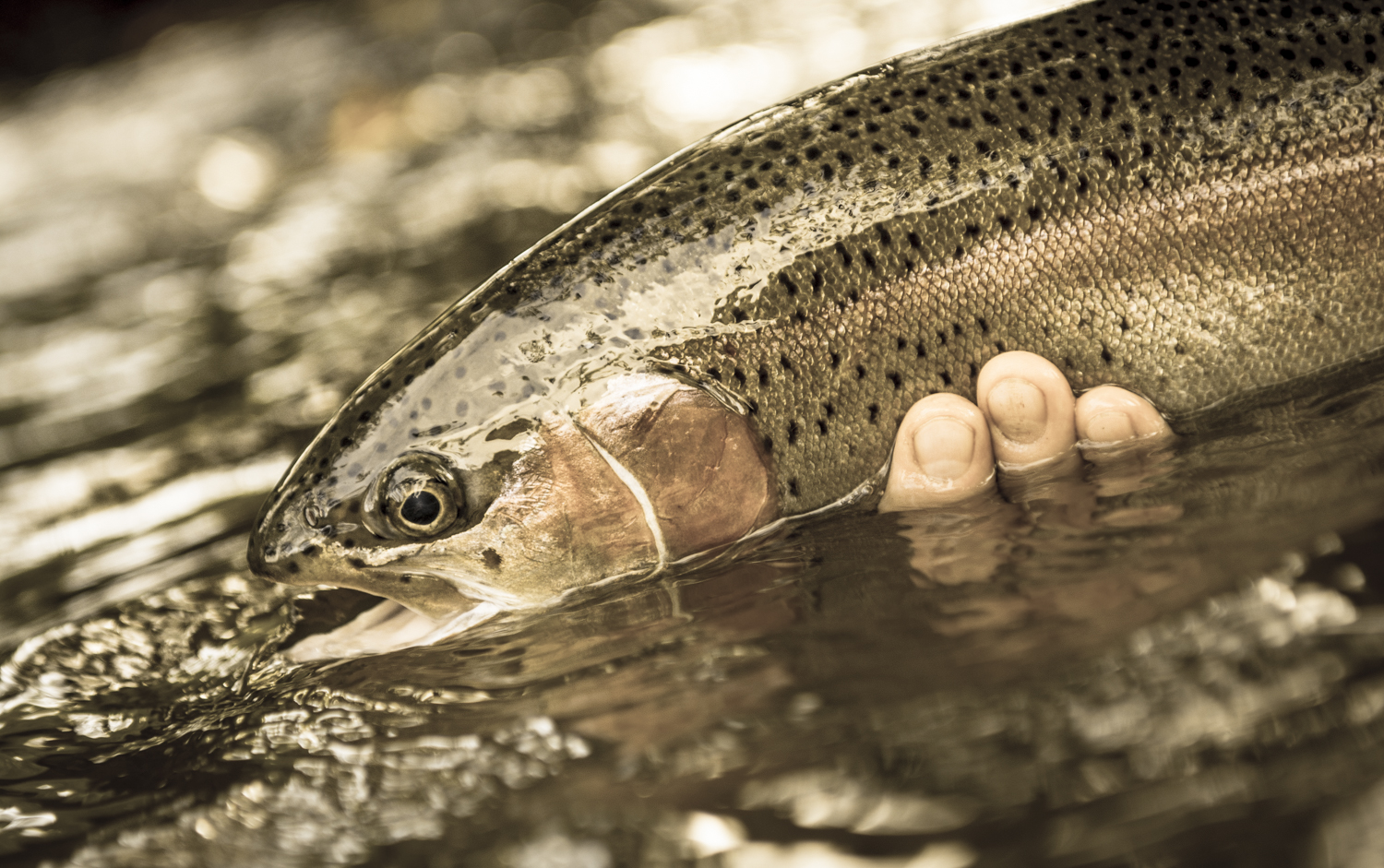By Louis Cahill
Are you practicing the techniques that actually catch fish?
This idea came to me as a result of a Facebook conversation. Kelly Galloup posted a great video about fly line tapers where he mentioned an article he read here on Gink and Gasoline. Thank for the nod Kelly, you are the man. It sparked such lively conversation that I thought it was worth expanding on.
Yes, fly anglers obsess about casting distance. We all want to shoot backing but most of us know that has very little to do with catching fish. I should say, with catching trout. And I’ll go ahead and get the caveats out of the way now. Everything I’m going to talk about in this article relates to trout fishing. There are types of fishing where distance matters quite a lot. You will also absolutely catch more trout if you can cast further.
Most importantly, we all want to grow and learn as anglers. Why should distance casting not be part of that growth? I just think it’s important to keep it in perspective. When it comes to trout fishing, there’s a long list of things that are more important than throwing a long cast. Once you’ve mastered them, cast for the moon. Why not? As long as those fundamentals stay in place, you’ll catch fish.
So here’s my list of 8 things that are more important in trout fishing than a long cast.
Line control and a good drift
Probably the single most important factor in catching a trout on the fly. If you want to catch fish work on mending, high sticking, reach casting and paying out line. There are lots of ways to catch fish but whether you’re fishing dry flies or nymphs, a good drag-free drift is is the most consistent producer. The best cast in the world is pointless without a good drift.
Accuracy
Whatever distance you’re casting, your fly needs to land on target. If the fly isn’t in the fish’s strike zone, you’re wasting your time. There are several things that go into an accurate cast. A good straight line rod path and a good sense of distance, for sure. Where most anglers fall short is in consistently turning over their leader. If your leader does not land straight every cast, you can’t expect to hit your mark.
Hook set
You can’t catch a fish without a hook set. There are 2 keys here, timing and detection. You always want to time your hook set so that you are applying pressure after the fish turns its head. That way you will pull the fly into the corner of his mouth, not straight out of it. Of course you first have to be aware of the take, and that’s where most fish are missed. As John Gierach said, you must learn to “set on the imperceivable take.” Translated, set and set often.
Loop control
Learning to make a tight, energized loop will pay off in several ways. It will allow you to put your fly wherever you like, whenever you like. That means hard to reach spots like under overhanging brush or right against an undercut bank. A clean loop will keep flies from tangling or sticking in your ear. It will help you cast in the wind and throw all kinds of bugs. Ironically, once you’ve mastered loop control, distance will no longer be a problem.
Stealth
Short, accurate casts are effective, but only if you can get into position to make them without spooking fish. Being a quiet and observant wader will catch you more fish than fancy casting.
Reading water
You have to find fish to catch fish. Learning to spot the current seams and breaks, drop offs and structure which attracts trout is one of the first things aspiring anglers should concern themselves with.
Casting position
While we’re reading that water, let’s take a minute to think about the currents we’ll be casting across. Finding the fish is one thing, making a successful presentation is another. Far too many anglers make things hard on themselves by rushing their presentations. Take the time to position yourself where you can get the best drift. A step or two is often all you need to set yourself up for success.
Entomology
Knowing the insects you’re imitating and understanding their lifecycles gives you a real leg up. You don’t need to know the Latin names, you just need to be able to identify what the fish are eating and understand how to imitate it. That imitation should include your fly choice and your presentation, meaning how you fish the fly.
I would never want to say anything that gave the impression that casting skill is not important. It is and casting distance is important too, but it’s not everything. As you develop as an angler you will naturally want to be a better cast and you’ll want to cast further. But in the mean time, work on these eight essential skills. When it comes to catching fish, they are all more important than a long cast.
Here’s Kelly’s video
Louis Cahill Gink & Gasoline www.ginkandgasoline.com hookups@ginkandgasoline.com Sign Up For Our Weekly Newsletter!


Absolutely agree. Too easy to get caught up in distance and the belief that a $900 rod will catch more fish. I would move “reading the water” toward the top of the list though. Understanding WHERE to cast is just critical. Nice article.
Thanks Dan. I wouldn’t consider those in order of importance.
Pingback: Shared from Gink & Gasoline | A Fly Rod in My Sea Bag
Pingback: Weekly Review |
Right on, as usual, Louis.
Trying to teach wounded veterans and kids to fish, my approach has always been to prioritize line control over casting distance and I get them on the water sooner rather than later. I know teaching correct casting technique is important, but it is also the most frustrating part of learning to fly fish. Pounding the cast trying to achieve distance and some semblance of a decent loop takes time and energy and increases frustration. Yes, we work on the grass with the cast first to get the basics, but putting them on water earlier, teaching stealth, line control, and a decent drag free drift, to me is more serene, less frustrating, and more beneficial than casting for long periods until they “get it.” Plus it gets them sooner to the tight line of that first fish, which is what really hooks them on fishing. Then they will be willing to put in the work on the cast to improve it and ultimately master it. I know some casting instructors will disagree.
Loved Kelly’s video and I agree with every word of it.
I would also include having a properly built leader to that list. When I started making my own leaders, I bought the cheapest line I could find; it was usually pretty limp. The result was that the energy of the cast was not transferred completely through the leader to the fly and the leader would collapse before it reached its mark or a slight breeze would easily move the fly to one side or the other.
I have since learned the value of quality leader material that is stiffer and better at transferring the casting energy, resulting in more accurate casts.
Great points Louis. Agree with Kelley Galloup too!
Choosing the right rod, reel & line and practicing fundamentals like accuracy, narrow loops and line control out to 30 feet or so, should be the focus of any fly fisher that wants to improve their success and enjoyment on the water.
As you know, an 11 year old junior named Maxine McCormick, outperformed nearly all adult fly casters at the 2015 U.S. National Casting Championships and broke numerous records in the process. To learn some of Maxine’s secrets, readers should listen to your excellent recorded interview here:
(http://www.ginkandgasoline.com/fly-fishing-news/maxine-mccormick-interview/)
and watch recent TV coverage here:
(http://www.csnbayarea.com/video_content_type/born-cast-11-year-old-maxine-mccormick-mastering-fly-fishing).
Like in any sport, it’s always about practicing and refining fundamental skills, usually best done by performing lots of fun drills. Doesn’t matter if you’re a little girl trying to cast a narrow loop at 30 feet or Stephen Curry taking 3-pointers at a hoop.
I suggest your readers grab some of the ‘hula’ variety and start practicing their accuracy!
Chris Korich
National Casting Champion
http://www.americancastingassoc.org
Louis and Kelly
Great advice. Thanks Kelly for “schooling” me about double tapers.
Ted